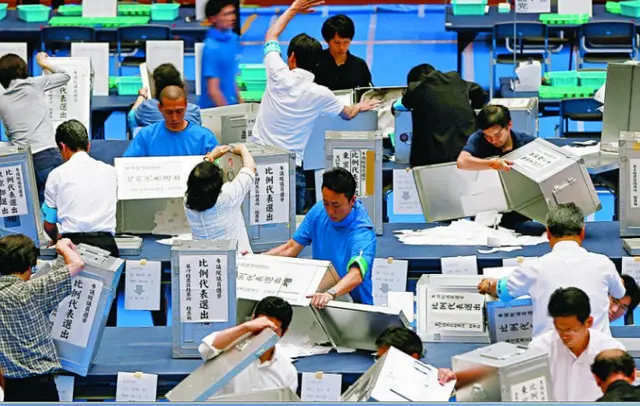Two groups of lawyers on Monday mounted legal challenges to the results of Sunday’s elections in Japan, claiming that the disparity in the value of votes in different parts of the country made the poll unconstitutional.
One of the complaints was filed in Hiroshima High Court, with a second similar legal challenge to the outcome of the Upper House election expected to be presented later on Monday in Tokyo.
On a good day for Prime Minister Shinzo Abe, his Liberal Democratic Party and its allies won a convincing victory on Sunday over the lacklustre opposition.
Taking 69 of the 121 seats being contested in the 242-seat chamber, the ruling coalition now holds 145 seats to the opposition’s 97 seats and Abe and his key lieutenants have been quick to claim that the result gives him a mandate to push for reform of the Constitution.
That majority is being challenged, however, with courts to hear legal arguments over the validity of the results. The lawyers’ groups have said they want the outcome of the entire election nullified – although analysts point out that similar challenges have failed in the past.
The problem revolves around the comparative value of a single vote in Japan’s densely populated urban constituencies and that of a voter in a rural region.
According to research by Kyodo News, a vote in Fukui Prefecture is effectively worth 3.08 votes in Saitama Prefecture, in the commuter belt north of Tokyo.
Critics say that difference in value is contravenes the constitution, which says all votes should have equal weight.
“These discrepancies have been a bit of a problem for quite a while now, and there have only been slow moves to solve the problem,” said Stephen Nagy, an associate professor of politics at Tokyo’s International Christian University. “It means voters in prefectures like Iwate or Morioka are able to return the same number of representatives as Tokyo, which has a far larger population, and are therefore able to unduly influence policy, taking it in directions that are beneficial to their specific needs.” he told theSouth China Morning Post.
Prefectures that have economies that are primarily agriculture-based, for example, have railed against the recent discussions over the Trans-Pacific Partnership free trade arrangement.
“And historically, the LDP has benefited from this imbalance as they have used rural prefectures to push through pork-barrel projects and reforms that have helped their vested interests,” Nagy explained.
Shinzo Abe downplays poll win that could help remove bar on Japanese troops going to battle
Reforms to Japan’s 45 electoral districts were enacted last year after the Supreme Court ruled ina previous case that the July 2013 election for the Upper House of the Diet had been unconstitutional. In that result, a vote in a rural constituency was worth 4.77 votes in an urban district.
The court had been urged to overturn that election result as well, but declined to do so. Instead, it called on the Diet to rectify the situation.
In last year’s reforms, three prefectures that previously returned four representatives saw that number slashed to just two, while five other prefectures – including Tokyo – each gained an extra two politicians.
Given that political change slow to take hold in Japan, in particular when it does not benefit the ruling party, Nagy said he expects the legal complaints to “not get anywhere”.
(SCMP)
 简体中文
简体中文



